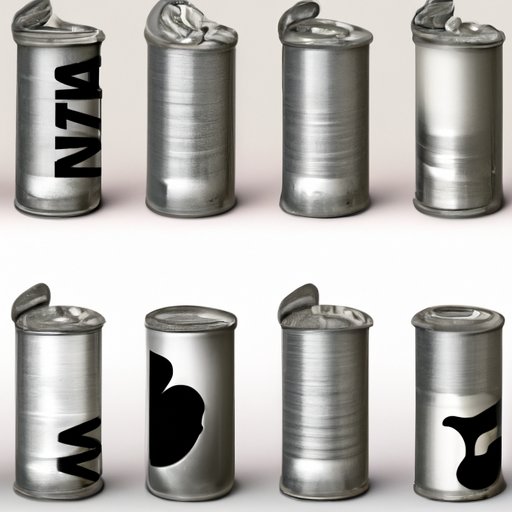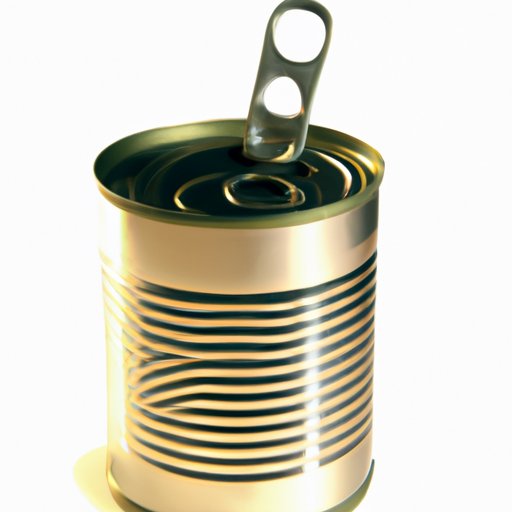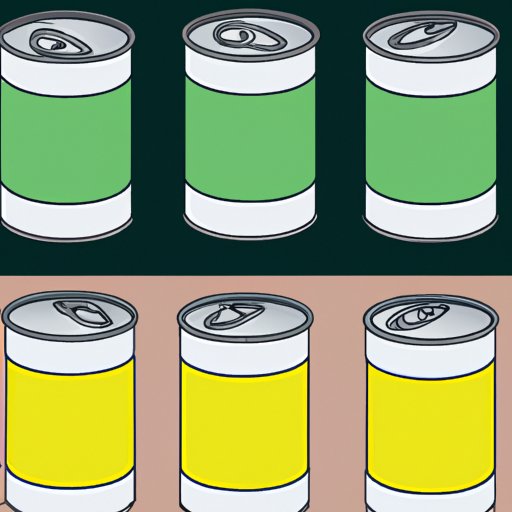Introduction
Cans are an essential part of our everyday lives. From canned tomatoes to tuna fish, it’s hard to imagine a world without them. But when were cans invented? To answer this question, we need to explore the history of canning and the invention of cans.
History of Canned Food: Exploring the Invention of Cans
The invention of cans was a major milestone in food preservation. Before the invention of cans, food was preserved by drying, salting, or smoking. This method of preservation was inefficient, and it often resulted in food that was unappetizing or unhealthy. The invention of cans changed all of this.
The Inventor Who Shaped Our Pantries: A Look at the Invention of Cans
The invention of cans is credited to Frenchman Nicolas Appert. He was a French confectioner and chef who had been asked by the French government to come up with a way to preserve food for military use. After several years of experimentation, Appert finally came up with the idea of preserving food in airtight containers. He published his findings in 1810, and for his efforts he was awarded 12,000 francs.
How the Can Revolutionized Food Preservation
Appert’s invention revolutionized food preservation. Airtight containers allowed food to be stored for longer periods of time, which meant that it could be shipped farther distances and still remain edible. This made it possible for people to enjoy foods that they would not have been able to access before. It also made it easier to store food during times of scarcity, such as wars or natural disasters.

A Timeline of Cans: From Idea to Reality
Appert’s invention was a major breakthrough in food preservation, but the invention of cans didn’t happen overnight. It took decades for cans to become a part of everyday life.
Major Milestones in the Invention of Cans
In 1812, British merchant Peter Durand patented Appert’s invention. He replaced Appert’s glass jars with tin-plated iron cans, which were much sturdier and easier to transport. This marked the beginning of the modern canning industry.
In 1825, Englishman Bryan Donkin developed a machine that could seal cans quickly and efficiently. This made it possible to mass-produce cans, which allowed them to be sold at a much lower cost. By the 1840s, canned goods were being sold in stores across Britain.
In the United States, the invention of cans was slow to catch on. It wasn’t until the Civil War that cans became widely used in the US. At the time, cans were seen as a luxury item, and they were often given away as prizes in lotteries and competitions. By the late 1800s, canned goods had become commonplace in American households.
How Cans Changed the Way We Eat: A Look at the Innovation of Canning
The invention of cans changed the way we eat in many ways. Prior to the invention of cans, most food was eaten fresh. This meant that it had to be purchased frequently and had a limited shelf life. With canned goods, food could be stored for long periods of time and still remain safe to eat. This made it possible to enjoy out-of-season produce year-round, and it allowed people to enjoy a wider variety of foods than ever before.

The Impact of Cans: Examining the Role of Cans in Modern Cuisine
Today, cans are an essential part of modern cuisine. They are used to store fruits, vegetables, meats, soups, and other foods. Let’s take a closer look at the impact of cans on modern cuisine.
Benefits of Cans for Consumers
Cans offer many benefits for consumers. They are convenient, easy to store, and relatively inexpensive. They also make it possible to enjoy out-of-season produce year-round. According to a study by the University of California Davis, “canned fruits and vegetables are nutritionally equivalent to their fresh counterparts.” This means that canned goods provide the same nutritional benefits as fresh produce, making them a great option for health-conscious shoppers.
Impact on the Environment
Cans also have an impact on the environment. According to the Environmental Protection Agency (EPA), “cans are one of the most recycled food packaging materials.” This means that cans can be reused multiple times, reducing the amount of waste that is generated. This is beneficial for both the environment and consumers, as it reduces the need for new materials and helps to conserve natural resources.
Popularity of Cans Today
Today, cans are more popular than ever. According to the Can Manufacturers Institute, “the canned food industry is a multi-billion dollar business, with over 200 billion cans produced each year.” This shows just how important cans are to modern cuisine.
Conclusion
The invention of cans has had a profound impact on modern cuisine. It has made it possible to enjoy out-of-season produce year-round, and it has made it easier to store food for long periods of time. Cans are also recyclable, making them a great choice for environmentally conscious consumers. Cans are an essential part of modern cuisine, and they show no signs of slowing down.
From Appert’s invention to Durand’s patent to the modern canned food industry, the invention of cans has revolutionized food preservation. It has made it possible to enjoy a wide variety of foods year-round, and it has made it easier to store food during times of scarcity. Cans are an essential part of our everyday lives, and their invention has changed the way we eat.
(Note: Is this article not meeting your expectations? Do you have knowledge or insights to share? Unlock new opportunities and expand your reach by joining our authors team. Click Registration to join us and share your expertise with our readers.)
